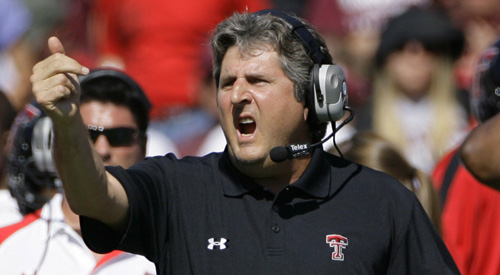
Why a 64-team NCAA football tournament just might eventually work
When unconventional Washington State coach Mike Leach said he thinks a 64-team NCAA Division I FCS football playoff would be ideal, there was plenty of derision from many corners. After all, this is a sport that currently avoids playoffs altogether at the FCS level thanks to the BCS system, and although that system’s proven so problematic that things may be starting to change, the most widely-discussed solution would involve only four teams. Thus, many saw Leach’s comments as out of touch and further evidence of his quirkiness. However, upon further reflection, Leach’s comments have some rationale behind them, and they may just reflect where the NCAA winds up a ways down the road.
The chief problem with the BCS format is that it’s an imperfect way to decide a champion; when two teams have roughly equivalent resumes, one of them gets a full opportunity to play for a title, while the other has no chance at all. A four-team playoff solves part of this, as the field of teams that can compete for a national title following the season is expanded from two to four, but picking those teams is still quite a difficult task. Determining which conference champions should make it, what sort of opportunities smaller-conference schools and independents should have, and if teams that didn’t win their conference (like eventual 2011-12 national champion Alabama) should be included isn’t easy, and it’s particularly difficult to come up with a fair system of criteria that can anticipate the wide variety of situations likely to arise. A four-team playoff seems better than the BCS, but it would still have plenty of issues, and we’d likely see some of the same controversies that have plagued the BCS erupt again under that system.
[php snippet=1]
By contrast, while Leach’s discussion of 64 teams may seem fanciful for the moment, it has several advantages. There would still be debate around which bubble teams make it and don’t (much like we see in the NCAA basketball tournament), but the debates at the upper end would revolve around seeding, not complete exclusion. If a great team isn’t highly thought of by the committee or the system for one reason or another, they still have an opportunity to prove their case on the field. Moreover, this would also provide some great upset potential. Sure, a Southern Mississippi or a Northern Illinois isn’t all that likely to beat an Alabama or a LSU, but they still might every once in a while. In basketball, March Madness thrives off that unexpected insanity; who’s to say football couldn’t benefit from it as well?
Some undoubtedly will argue that this kind of large tournament would add too many postseason games and make the season drag on too late, but that concern can be addressed as well. College football currently has 35 bowl games following the regular season, and they start several weeks after the season concludes in the first week of December. If you do the most basic kind of 64-team tournament and play one round each week, you’d be down to 32 teams by the second weekend of December, then 16 teams by the third weekend and eight by the fourth. The last week of December or first week of January would be the quarterfinals, followed by the semifinals and then the national title game, so the season would wrap up by the second or third week of January, not all that much later than this year’s end date of Jan. 9.
Most teams wouldn’t play many more games, either; half of the teams involved would still only have one postseason game, while most of the remainder would play one or two more. That doesn’t seem all that odious. These games could even be played at the existing bowls, allowing most of them to keep going, and they’d make for much more meaningful football in December. From this corner, that would be a good thing.
Does this mean that Leach’s proposal’s going to be implemented any time soon? In a word, no. The NCAA isn’t big on change in football, and particularly not radical change. If the BCS is scrapped this year or in the next few years, and that’s still up in the air, it likely only would be ditched in favour of a four-team tournament. However, that doesn’t mean the sport’s going to stick with that forever. Keep in mind that the basketball tournament, which is currently at 68 teams (if you count the play-in games), started with just eight in 1939. Once a playoff starts, expansion seems quite likely; it’s the easiest way to make more money and include more meaningful, marketable games, while also dealing with some of the issues of who’s selected. A 64-team field seems incredibly far down the road at the moment, but who’s to say won’t eventually get there? Everyone may be laughing at Mike Leach’s comments now, but they just may prove prescient in the long run.
[php snippet=1]

